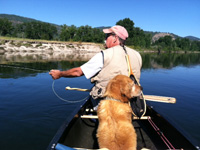 GOP-backed bill is most serious attack on America's Wilderness Act in history
GOP-backed bill is most serious attack on America's Wilderness Act in historyThe Wilderness Act has protected America's wild lands for 50 years. It is now under threat by a House bill deceptively called The Sportsmen's Heritage Act. Citizens must demand the US Senate do nothing to advance its devastating provisions.
Opinion
Christian Science Monitor
By Stewart Brandborg / November 30, 2012
Hamilton, Mont.
Conservationists and wilderness enthusiasts across America are mobilizing to defeat a bill passed by the House of Representatives in April that would eviscerate the 1964 Wilderness Act.
Deceptively entitled the Sportsmen's Heritage Act, the bill (H.R. 4089) purports to protect hunting, fishing, and recreational shooting. The bill is being pushed by powerful groups like the National Rifle Association and Safari Club International and supported by some of the most anti-wilderness Republicans in Congress. And it would effectively gut the Wilderness Act and protections for every wilderness in America's 110-million-acre National Wilderness Preservation System – everywhere from the Boundary Waters Canoe Area Wilderness in Minnesota to the Selway-Bitterroot Wilderness along the Montana-Idaho border that I can see from my home.
The House bill's provisions could still become law during the current lame-duck session of Congress. Though the Senate is considering a different sportsmen's bill that does not include the harmful elements, the Senate bill could eventually be merged with the devastating House bill in order to pass both chambers.
The Wilderness Act eloquently defines wilderness as "an area where the earth and its community of life are untrammeled by man, where man himself is a visitor who does not remain." The statute further designates wilderness as an area that retains "its primeval character and influence, without permanent improvements or human habitation" and is "protected and managed so as to preserve its natural conditions."
I know the Wilderness Act. I worked alongside my mentor, Howard Zahniser of the Wilderness Society (the bill's chief author and proponent), from 1956-1964 to gain its passage by Congress. After Zahniser's untimely passing in 1964, I directed the Wilderness Society for the next 12 years in implementing the new law and in adding new areas to the National Wilderness Preservation System. Congress responded to requests from the American people by adding tens of millions of acres to the wilderness system. Today, that system has grown from the original 9 million acres in 1964 to nearly 110 million acres. The Wilderness Act provides the best and most protective standards of all types of federal public land protection.
But this great legacy of American Wilderness is essentially destroyed by H.R. 4089 in several key ways.
First, H.R. 4089 elevates hunting, fishing, shooting, and wildlife management above wilderness protection within designated wilderness areas. Visitors or wildlife managers could drive motor vehicles and build roads, cabins, dams, hunting blinds, aircraft landing strips, and much more in wildernesses if any of these activities could be rationalized as facilitating opportunities for hunting, fishing, shooting, or managing fish and wildlife.
The only limitation in H.R. 4089 on motor vehicles or development is that the activity must be related to hunting, fishing, shooting, or wildlife management, though that need not be its only or even primary use. In reality, almost any recreational or management activity could be shoehorned into one of these exceptions and thereby exempted from Wilderness Act safeguards.
Perhaps even more troubling, H.R. 4089 would waive protections imposed by the Wilderness Act for anything undertaken in the name of wildlife management or for providing recreational opportunities related to wildlife. This would allow endless manipulations of wildlife and habitat.
This could include logging, if done to stimulate new forest growth on which deer might graze. Similarly, bulldozing new dams and reservoirs could be validated as a way to enhance fishing habitats. Poisoning lakes and streams to kill native fish and then planting exotic fish might be allowed under the guise of increasing fishing opportunities. And predator control (including aerial gunning and poisoning) could be defended for boosting the numbers of popular hunted species like elk or bighorn sheep that predators also eat.
There is no limit to what managers could do in designated wilderness areas all in the name of wildlife management or providing opportunities for recreational hunting, fishing, and shooting. These provisions strike at the heart of the Wilderness Act and its foundational underpinnings to preserve wilderness untrammeled and native wildlife in its natural environment.
Sportsmen and sportswomen – those who hunt and fish – were, and continue to be among the strongest supporters of the original wilderness law, of designating wilderness lands, and of the special quality of fishing and hunting experiences that wild and undeveloped lands provide. Many of these folks are fighting to prevent eviscerating the law and its wilderness preservation safeguards.
For nearly a half-century, the Wilderness Act has protected the finest of America's wild lands and created a National Wilderness Preservation System that is the envy of much of the world. H.R. 4089 would negate all that we have preserved. In my 60 years of work for wilderness preservation and management, our nation has never been threatened by a more serious attack on this irreplaceable publicly owned resource. Citizens must demand that the US Senate do nothing to advance the House provisions of the so-called Sportsmen's Heritage Act and instead protect our grand wilderness legacy for future generations.
http://www.csmonitor.com/Commentary/Opinion/2012/1130/GOP-backed-bill-is-most-serious-attack-on-America-s-Wilderness-Act-in-history
Wilderness icon Stewart Brandborg worked hand-in-hand with wilderness bill-author Howard Zahniser in the late-50s/early-60s to get the Wilderness Act passed and is the only person living today who worked day-to-day on the bill. After Zahniser's untimely death in 1964, Brandy took over as executive director of the Wilderness Society until 1976. He remains very active in Wilderness and public lands issues, is a long-time Wilderness Watch board member and now serves as a senior advisor. He is an incredible inspiration to all.
11149 Hits

 An undercurrent of hostility toward wilderness boiled over in the U.S. House of Representatives when members passed H.R. 4089, the so-called
An undercurrent of hostility toward wilderness boiled over in the U.S. House of Representatives when members passed H.R. 4089, the so-called Jeff Smith is Wilderness Watch's membership and development director.
Jeff Smith is Wilderness Watch's membership and development director.